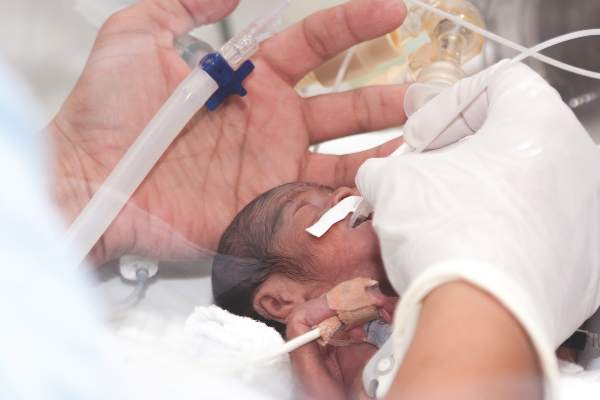FROM PEDIATRICS
Extremely preterm infants born to diabetic mothers starting insulin before pregnancy faced a greater risk of microcephaly, birth defects, necrotizing enterocolitis (NEC), and late-onset sepsis, compared with extremely preterm infants whose mothers started insulin during pregnancy or who didn’t need insulin, found a recent study.
“Importantly, however, no differences in neurodevelopmental outcomes at 18-22 months were observed between the groups,” reported Nansi S. Boghossian, Ph.D., of the University of South Carolina, Columbia, and her associates online (Pediatrics. 2016 May 13. doi: 10.1542/peds.2015-3424 ).
The researchers compared outcomes among 10,781 infants born at 22-28 weeks’ gestation and either born or cared for at any one of 24 Eunice Kennedy Shriver National Institute of Child Health and Human Development Neonatal Research Network centers between 2006 and 2011. Of these infants, 5% had mothers with insulin-dependent diabetes, who were divided based on when they began insulin treatment. After excluding the 29 cases lacking data on insulin initiation, 58% of the infants had mothers who began taking insulin before pregnancy, and 36% began insulin treatment during pregnancy.
Among the 26% of infants who died, the risk of death was similar between those born to mothers without insulin-dependent diabetes and those born to mothers who started insulin before pregnancy. Compared with the 18% mortality in infants born to mothers starting insulin during pregnancy, however, the 27% whose mothers started before pregnancy had a narrowly significant 33% greater risk of death (relative risk = 1.33; P = .054).
The researchers also assessed morbidity for the 89% of infants who survived at least 12 hours after birth. Children of mothers starting insulin before pregnancy had a 55% greater likelihood of necrotizing enterocolitis and a 26% greater risk of late-onset sepsis (RR = 1.55, RR = 1.26), compared with newborns of mothers not needing insulin. The increased NEC risk “might be due to higher polycythemia rates among these infants,” the authors suggested. Compared with babies whose mothers started insulin during pregnancy, increased risk of NEC or late-onset sepsis among those born to mothers who took insulin before pregnancy did not reach significance. However, results were significant for the latter’s 45% greater risk of death within 12 hours or NEC, and 35% greater risk for death within 3 days or late-onset sepsis.
Within the first 28 days of hospitalization, retinopathy of prematurity occurred in 57% of infants whose mothers began insulin pre-pregnancy and in 49% of those whose mothers started insulin during pregnancy, translating to a 23% increased risk for the former group. However, incidence of patent ductus arteriosus, early-onset sepsis, intraventricular hemorrhage, periventricular leukomalacia, or bronchopulmonary dysplasia was not significantly different across all three groups, nor was a composite risk of morbidity and death.
Average head circumference z scores at 36 weeks post-menstrual age were greater for those born to mothers starting insulin before pregnancy, compared with the other two groups. Similarly, microcephaly occurred among 25% of the former and 18% of mothers not needing insulin (P = .003). At 18-22 months corrected age, 7% of children whose mothers started insulin before pregnancy had birth defects, compared with none of those whose mothers started during pregnancy and 2% of those whose mothers didn’t need insulin.
“The etiology of diabetes might differ based on the timing of insulin use,” the authors noted, pointing out that women starting insulin before pregnancy likely had type 1 or type 2 diabetes whereas only type 2 diabetes or gestational diabetes would probably occur among those starting insulin during pregnancy.
The research was funded by the National Institutes of Health. The authors reported they had no disclosures.






